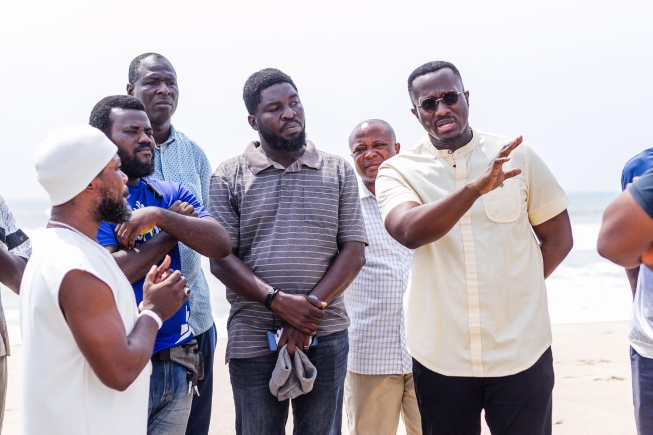As Ghana approaches the tenth anniversary of the June 3, 2015, twin flood and fire tragedy that claimed over 150 lives in Accra, technology professional and community advocate Nii Ashitei Ashietey has launched a bold community-led effort to desilt the Klottey River, one of the capital’s most flood-prone waterways.
Operating with limited resources, Nii Ashitei mobilised a dredging team to clear critical sections of the river in the Klottey Korle constituency, a jurisdiction that bore the brunt of the 2015 disaster and continues to suffer from annual flooding. For several days, the dredger removed significant amounts of silt, waste, and debris that have long obstructed the river’s flow and contributed to perennial inundation of homes and roads.
“It has been 10 years since the June 3rd tragedy, yet we are still grappling with the same problem,” Nii Ashitei said. “The Klottey River continues to pose a significant risk to lives and livelihoods. We cannot allow this cycle to persist.”
![]()
The June 3rd Disaster, widely regarded as one of the worst in Ghana’s history, remains a haunting reminder of the consequences of inadequate drainage systems and unregulated urban sprawl. Despite government interventions since the catastrophe, flooding continues to threaten urban centres across the country, particularly in Accra.
Nii Ashitei’s initiative, though modest, has ignited new conversations about civic leadership and grassroots solutions. He has urged the Ministry of Works and Housing, the Klottey Korle Municipal Assembly, and other relevant agencies to go beyond seasonal interventions and commit to long-term engineering solutions.
“The loss of life and property from these floods is a national tragedy, and we cannot afford to wait for the next disaster before acting decisively,” he said. “This is not just an environmental issue; it’s a national security concern, an economic challenge, and a human crisis.”
He is advocating for the re-engineering of Accra’s outdated drainage infrastructure, particularly where rivers like the Klottey discharge into the sea. He also called for consistent maintenance, regular dredging, and a strong public education campaign to shift behaviours that contribute to environmental degradation.
Residents of Osu, Adabraka, and other low-lying parts of the constituency who often bear the brunt of the floods have welcomed the dredging effort. While they expressed appreciation for Nii Ashitei’s commitment, they underscored that lasting relief must come from sustained government leadership and funding.
The Klottey River initiative also aligns with Ghana’s broader climate adaptation agenda and President John Dramani Mahama’s vision for building sustainable and climate-resilient cities. Yet, Nii Ashitei warns that unless the momentum is sustained, Accra will continue to face avoidable disasters each rainy season.
Beyond his work on flood resilience, Nii Ashitei is also pioneering an ICT and Data Analytics Lab in Osu to equip young people with digital skills.
“We are building the future through education and technology, but our people must first have safe and secure environments to thrive,” he stated. “Addressing the Klottey River flooding is not just an environmental issue—it’s an economic and social imperative.”
With the rainy season already in full swing and the spectre of June 3rd looming large, Nii Ashitei’s call to action is a timely reminder that solving Ghana’s flood crisis will require a blend of political will, community ownership, and sustained investment.

